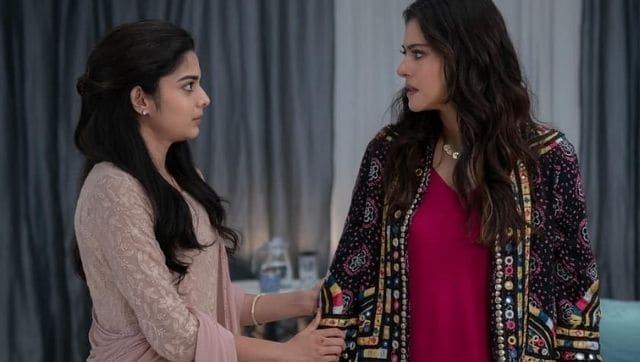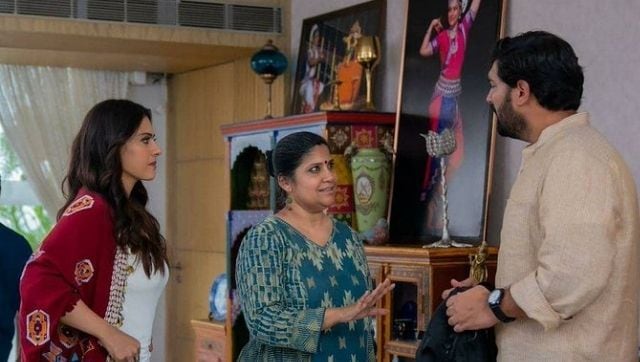The Netflix original, _Tribhanga_: _Tedhi Medhi Crazy_ starring Kajol, Tanvi Azmi and Mithila Palkar, explores the dynamics between three generations of mothers and daughters. Mothers, too falter, and it is important to not judge them for it, the film appears to say. That exploration resulted in Tribhanga: Tedhi Medhi Crazy, which is written and directed by Renuka Shahane, starring Tanvi Azmi as the eminent writer Nayan, Kajol as her daughter Anu, and Mithila Parkar as her granddaughter Masha. Anu is a tempestuous movie star and Odissi dancer whose bitterness towards Nayan is unshaken even when Nayan is hospitalised after a stroke. “There are definitely parallels in the story that I can relate to but the situations are completely different. There are so many things that my character Anu said resonated with me totally but my relationship with my mother is completely different from what is shown and my relationship with my daughter is a lot like it but my daughter is completely different,” says Kajol.
The story came from a desire to explore how our relationships with the mother figure affects our journeys, especially when we become mothers, says Shahane. And someone who shares a loving relationship with her mother, helming the project was definitely a challenge yet interesting. “My mother is my support and I have a very loving relationship with her which is certainly my core. This whole thing – if the core of my being is unsettled in some way, what would I have been – was something I wanted to delve into. Some time back I met an acquaintance who hated her mom. She had recently got married and she very casually said that she was glad to escape her mother. Meeting her was the beginning of the story that was the starting point for me. This was the first time that I had met a person who said that she hated her mother. It was very strange for me to experience that. It’s a reaction to the kind of relationship I have with my mother. It is so well rounded and complete and I have so much gratitude and that itself I turned it around. Also, the cultural milieu is very familiar to me because my mom is a writer,” says Shahane.
[caption id=“attachment_9205471” align=“alignnone” width=“640”]  Kajol and Mithila Palkar in Tribhanga[/caption]
What drew Kajol to the film is the way the three lives and relationships are woven together. “I loved the script and all the characters in it. Every scene is so well written. For me, the script has to be like one of those fantastic books and it was so good Renuka directing me. When she narrated the film she was so clear about each and every character in the film, why they are there, who they are and the motivation behind them. Renuka had a very firm grasp on what she wanted to say. She would even enact every actor’s scene with their dialogues. The film is made in three different languages – English, Hindi and Marathi which lends authenticity to the film. Tanvi’s character is a Maharashtrian writer, she is so much in character, you identify with her and at no point do you feel there is something off or wrong in the film. It doesn’t sound incorrect,” says Kajol, who could relate to the characters of both, Anu and Nayan. “I’ve always had strong women around me — like my mother and my grandmother — who made non-conformist decisions and encouraged that in me as well,” she adds.
While Shahane was a bit hesitant of working with a star initially, Kajol feels the director never had that problem with her. “I have always respected her as an actor. I worked with her husband (Ashutosh Rana) in Dushman and have the highest regard for him as well. When she narrated the script there was an instant camaraderie. I don’t do anything half heartedly. I also want to have fun when I am doing something. On the set it was full madness,” says Kajol. “I have always chosen films that I wanted to do and I have never worried about mainstream or art. If I don’t like the script then it doesn’t matter however mainstream it is. I have never bothered about what others say about a film, if I believe in it I will stand by it. Tribhanga is made with people with no ego or insecurity. There are so many strong and a great mix of women who put it together and that was amazing to experience. Everybody was so cool and comfortable about who they are,” she adds.
“When I wrote the script my main characters, the women were of different ages, they were older than what they are shown now. Nayan was 80, Anu was 58, Masha was 37 who had a 12-year-old daughter. But the equation between four generations was pulling it too long. When Siddharth P Malhotra (producer) heard the script he immediately thought of Kajol for Anu. In my wildest dreams I didn’t think of her firstly because she looks so young. I didn’t want to cast her as a mother of a grown up girl, secondly she is such a huge superstar. Luckily for me Kajol loved the script. I narrated to her in a period of time and it was a huge thing for me that she agreed and then Ajay Devgn stepped in as a producer. Eventually Kajol felt that Anu was meant for her. Kajol is an absolute dream to work with. Once she loved the character, she put her soul into it. She was like clay, she was open to everything that I told her because of the trust we had in each other. I was very happy to get all the three women. They look like they are from the same family, and yet they are so different from each other,” says Shahane.
[caption id=“attachment_9205481” align=“alignnone” width=“640”]  Director Renuka Shahane with Kajol and Kunaal Roy Kapoor in Tribhanga[/caption]
Shahane, who adores Odissi, uses the classical dance form as a metaphor for her characters. Anu describes Nayan as the slightly off-centre pose ‘abhang’, Masha as the in-balance ‘sama-bhang’, and herself as ‘Tribhanga’, the pose with three bends at varying angles. “I love Odissi and I find it so correct to name the film Tribhanga because it has three different women from the same family, they are connected. It is like an obtuse triangle, all the angles are different but they are all connected. Tribhanga reflects that beautifully,” says Shahane. “The way Renuka has put it is great. Tribhanga, the pose is actually asymmetrical but it looks so symmetrical because it is attached to one body. It is like you may think differently from your parents, you may have different opinions and a completely different view point on your life but the roots are the same. The umbilical cord relationship never gets cut. You have to face it, fix it before you go further in your life,” adds Kajol.
Apart from being set in a world of writers, dancers and performers, the film in a way also addresses feminism with three strong female characters having different viewpoints. “These women want to lead their lives on their own terms, especially Nayan and Anu. Because of the choice that Nayan made, Anu became the person she was. Because of the choices that Anu made, Masha became the person she was. We are not saying right or wrong, correct or incorrect. These are reactions,” says Azmi, adding that she found it fascinating how “Anu is almost actually exactly like her mother, which she doesn’t realise till she has a daughter of her own”. “This is the kind of film that is going to open up doors to many equations and probably children will also be sensitized to their mothers and not expect their mothers to be superhumans all the time. They will understand that mothers are also humans, they have feelings and it is possible that they make wrong decisions but not with wrong intent. Tribhanga is about human beings, feelings, resurrection, realization, it is about acceptance,” says Azmi.
“Whenever we talk about feminism we have a very rigid way of looking at it. Feminism is about inclusivity and therefore each person has the freedom of choice, the fact that choice is not imposed on anybody is the key for me,” says Shahane. “Feminism at its root is making your own choices without coming under any kind of pressure. That is exactly what the three characters do with their lives even though they have different viewpoints. They are different from each other but they are part of one unit, they are strong personalities in their own way. They have their differences but at the same time they love each other as they say that it is only the person you love so much that you can hate to this extent,” sums up Kajol.
(All images from Twitter)


)
)
)
)
)
)
)
)
)



